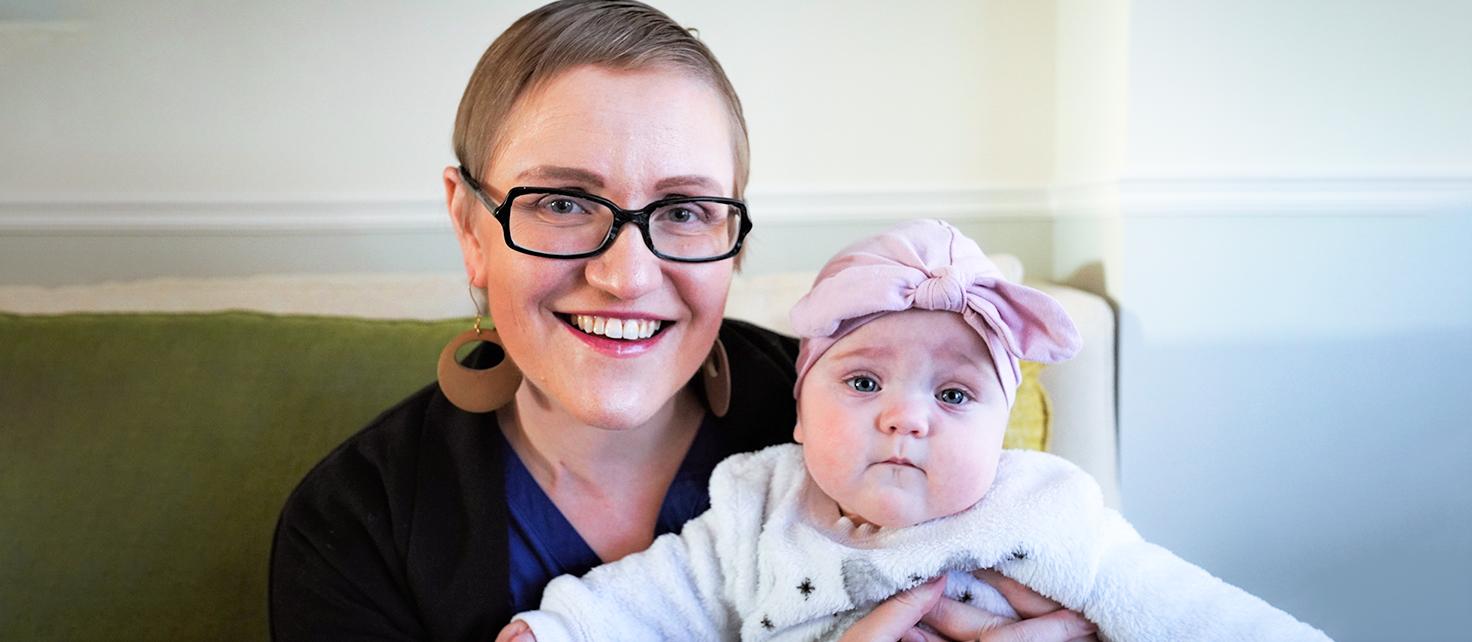Margaret Loniewska says diagnosis has reinforced importance of moving new discoveries forward to be accessible for patients
As a former researcher, Margaret Loniewska knows the thrill of discovering something new. But in the last year, her experience being diagnosed with and treated for metastatic breast cancer has given her a new perspective on the importance of moving these discoveries forward to be accessible to patients.
“When I was doing bench research, I would be so happy to get a good result. But a result in a lab is often disconnected from the patient,” says Loniewska. “How do we translate that research into something that actually helps patients?”
Loniewska completed her PhD in Pharmaceutical Sciences at the Leslie Dan Faculty of Pharmacy (LDFP), working with Peter Wells, who studies the effects of drug exposure on both fetal brain development and degeneration in the adult brain.
“Margaret was a hardworking student and one of the first in my lab to examine the biological similarities between degeneration in the adult brain and brain development in the fetus,” he says.
After Loniewska graduated in 2013, she pivoted from her research to work in project management and later studying pharmaceutical regulatory affairs. But in October 2019, she received news that would change her life.
Within just a few days, she found out she was pregnant – and she had breast cancer.
Loniewska’s tumour was small and thought to be early stage, and she had surgery to remove it. A month later she was admitted to hospital with severe back pain. She was then diagnosed with metastatic breast cancer that had spread to her bones and caused her ribs and spine to break and compress.
With such a serious diagnosis, her oncologists recommended starting chemotherapy right away. But Loniewska was still in the first trimester of her pregnancy. Given her experience in the Wells lab, she was acutely aware of how drugs – from the chemotherapy itself to anti-nausea and pain medication – could affect her baby’s physical and neurological development. She dove into the scientific literature to find out what she could about the safety of these drugs during pregnancy.
“During this time, I used my research background to look at what drugs I could take during pregnancy,” she says. “This is exactly what I studied, and now it was being applied to me.”
She received a chemo regimen that is safest for pregnancy, and she and her baby were closely monitored with weekly ultrasounds. Unrelated to the cancer or her treatment, Loniewska gave birth prematurely in January. Marianna, her daughter, spent three months in the neonatal intensive care unit and came home in March.
Pharmaceutical Sciences research addresses gaps in patient care
Breast cancer is considered to be one of cancer’s success stories, with new treatments available and survival rates climbing. But metastatic breast cancer is a different story. It is not curable, and treatments aim to help those with the disease live with good quality of life for as long as possible.
Some of the critical gaps in cancer care – such as more precise and non-invasive diagnostic and monitoring technology and targeted treatments to reduce side effects – are being addressed by LDFP researchers, including those at the precision medicine initiative PRiME and the Centre for Pharmaceutical Oncology.
“I hear about research into all of these developments and new targets for treatments,” she says, “but as a patient, how do I get access to them?”
That’s one reason why having researchers focused on clinical, social and administrative pharmacy issues working side-by-side with biomedical researchers in the Faculty is so important to improving patient outcomes and quality of life.
“Basic research is often just focused on molecules and mechanisms, which is important, but it doesn’t consider the barriers patients face in accessing new treatments,” says Loniewska.
“Having research that considers the complexities of the patient and the health system alongside biomedical research is critical.”
Wells, a long-time U of T professor, has seen the Faculty grow its research program over the years to include an expanded emphasis on clinical and social research. He says that the two different streams not only help biomedical researchers to consider the relevance of their work, but can also inspire new research directions.
“Working collaboratively, we see problems from different perspectives,” he says. “This wouldn’t be possible without that cross-fertilization of basic and clinical sciences.”
Loniewska shares patient voice through volunteer role
Loniewska’s treatment now consists of regular targeted and hormone therapies. With her cancer currently under control and her baby healthy, she is starting to think again about returning to her education. She also recently started volunteering as a patient advocate with ReThink Breast Cancer, a charity focused on breast cancer in young women, where she provides a patient voice in meetings with industry organizations and government officials.
“A year ago, I was in a hospital bed thinking that I was never going to get better. I thought I would spend the rest of my short life in a lot of pain and worried about my baby,” she says. “At this moment, I feel very fortunate that my treatment is helping me and allowing me to do a lot in my life.”
Advance ground-breaking cancer research at the Faculty.
Donate to the Centre for Pharmaceutical Oncology.
By: Eileen Hoftyzer
More News
Image

How Bebe Simelane’s summer research is fueling her passion for science
Through hands-on research, mentorship, and exposure to cutting-edge tools like AI, this USRP student is gaining the skills and confidence to pursue graduate studies and advance science.
Read More
Image

Faces of PharmSci: Kristy Scarfone
Co-supervised by Professor Jillian Kohler and Assistant Professor Jaris Swidrovich, MSc student Kristy Scarfone is researching how unregulated substance-related care and harm reduction vary across Ontario, with the goal of strengthening public health and showcasing pharmacists’ impact in this area.
Read More
Image

Research team aims to co-design diabetes and dementia support programs that meet community needs
Network for Health Populations funding will support collaborative project to improve health outcomes for immigrant communities in Mississauga.
Read More

